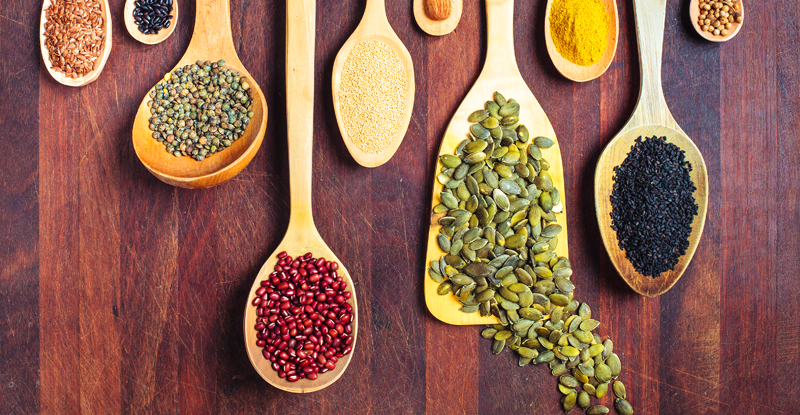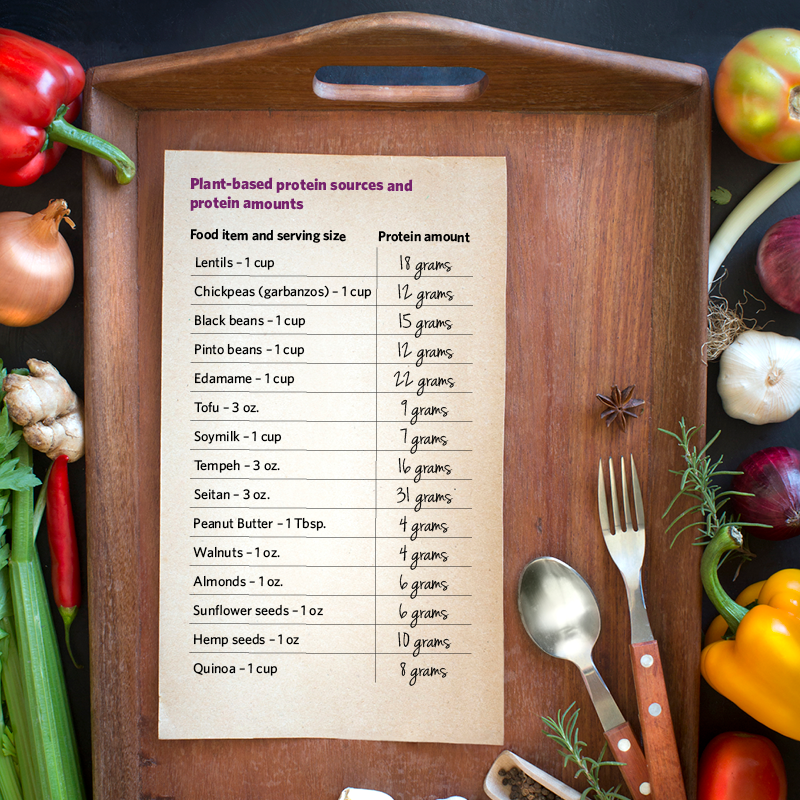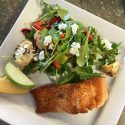Plant-based protein 101
By now, you’ve probably heard that plant-based diets are an up-and-coming trend in health and wellness. They are gaining traction with celebrities, professional athletes, and regular folks. So what’s all the fuss about?
What is a plant-based diet?
A plant-based diet is pretty much what it sounds like: a way of eating that emphasizes fruit, vegetables, whole grains, beans, and nuts and seeds over animal products such as meat, fish, poultry, milk and milk products, and eggs.
That means different things to different people. For some, that’s a vegan diet, while to others it may be some form of a vegetarian or flexitarian diet. But the common theme among all is the majority of the diet is made up of whole plant foods.
What’s driving the popularity of plant-based diets?
There are actually several driving factors: health, animal welfare, environment and sustainability, cost, and other personal preferences and beliefs.
As a dietitian, the factor with which I’m most concerned is health. Almost all health experts agree that one of the best things you can do for your health is to eat less meat and more plants. Plants are naturally free of cholesterol, trans fats, and added sugar. They are low in saturated fat (most of them), sodium, and calories. On the other hand plants are great sources of fiber, vitamins and minerals, and antioxidants.
What that means for our overall health is lowered risk for chronic conditions such as heart disease, high blood pressure, type 2 diabetes, and cancer. People following a plant-based diet also tend to weigh less than those who are not. There’s even evidence that some chronic conditions, like heart disease and diabetes, may be reversed using a plant-based diet for some people. If you’re still with me, you’re probably wondering…
But what about protein?
That’s a common question! For plant-based eaters, there are several so-called “nutrients of concern” (nutrients that those following a particular way of eating should account for in meal planning to ensure adequate intake). And all of them can be easily addressed with a little planning — just like with any other way of eating. Nutrients of concern for people following a plant-based diet are protein, iron, calcium, vitamin D, and vitamin B12. Protein, however, is often the biggest concern I hear from those shifting to or considering a more plant-based way of eating.
Protein is an important nutrient, and essential for proper functioning of the body. However, we don’t need nearly the amount of protein we’ve been conditioned to believe, and most people — even vegetarians — often consume more than they need. The Dietary Reference Intake (DRI) for protein for a healthy person is 0.8 grams per kilogram body weight, or 0.36 grams per pound body weight (use this calculator for a more personalized recommendation). For an average sedentary man, that’s around 56 grams, and for an average sedentary woman, around 46 grams. More active people need a little more protein.
Another important point to remember is that most everything we eat has at least a little protein in it, which can add up over the course of a day more than we often realize. For example, one cup of cooked oatmeal has 5 grams of protein before adding anything else to it.
What are the highest sources of plant-based protein?
Plant-based foods that have the most protein, and therefore should be eaten at least three to four times a day include legumes (lentils, chick peas, black beans, etc.), minimally processed soy products (tofu, soy milk, tempeh, edamame, etc.), and nuts and seeds (including nut butters). These foods also tend to be good sources of iron and calcium, and many soy products are fortified with vitamins D and B12. Check the labels to be sure.
There’s no need to worry about trying to pair plant foods for their amino acids, either. We used to think that because some plant foods don’t contain all the amino acids necessary to build a protein, that they should be eaten with other foods that contained the missing amino acids. For example, pairing beans with rice. Additional research has shown, however, that pairing foods is not necessary. The body can assemble proteins from amino acids you eat throughout the day. In other words, as long as you’re eating a balanced and varied diet throughout the day, you’ll get all the amino acids (and protein) you need.
Check out the sample menu below. It is based on an average sedentary woman. If you need more or less calories, you can adjust up or down. You can see how this example provides just over the minimum of 46 grams of protein and more than the minimum 25 grams of fiber.
Still worried about protein? Athletes the world over are turning to plant-based diets for their own health and personal beliefs — and are busting the protein myth out of the water. Here are just a few: Olympic track star Carl Lewis, ultra-marathoner Scott Jurek, MMA fighter Mac Danzig, tennis star Venus Williams, Olympic skier Bode Miller, New England Patriots quarterback Tom Brady, and competitive bodybuilder Torre Washington. Even Arnold Schwarzenegger recently gave his endorsement to plant-based eating.
If you’re like the majority of Americans you’re probably thinking, “Well that’s all well and good, but I could never give up [insert favorite animal food here] forever.” No worries! You don’t have to. Research indicates the closer a person gets to a plant-based eating pattern, the healthier he or she is likely to be. But think of it as a continuum of health, where the unhealthiest eating pattern is on one side, and a total plant-based diet is on the other. The closer you get to the plant-based diet, the more benefit you get.
Think about what you already eat that could be easily made plant-based. Pick one dish and try making the switch this week. Examples are chili (recipe here) and other soups, stir fry, oatmeal/breakfast cereals, salads, and wraps. What one step toward a healthier you will you take today?
For more on Meatless Monday, recipes, and further reading, check out the sources below.
Sources
http://www.meatlessmonday.com/
Tuso PJ, Ismail MH, Ha BP, Bartolotto C. Nutritional Update for Physicians: Plant-Based Diets. The Permanente Journal. 2013;17(2):61-66. doi:10.7812/TPP/12-085.
Gardner CD, Coulston A, Chatterjee L, Rigby A, Spiller G, Farquhar JW. The Effect of a Plant-Based Diet on Plasma Lipids in Hypercholesterolemic Adults: A Randomized Trial. Ann Intern Med. 2005;142:725-733.
Hu F. Plant-based foods and prevention of cardiovascular disease: An overview. Am J Clin Nutr September 2003; vol. 78 no. 3 544S-551S






